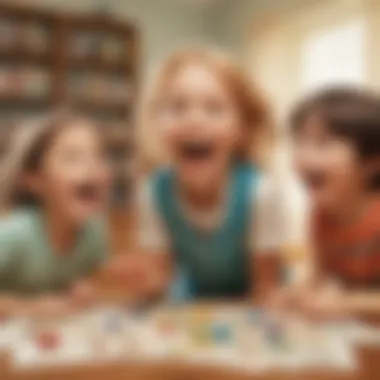Funny Games for Young Learners: Engaging and Educational


Intro
The integration of humor into education plays an essential role in cultivating an engaging learning atmosphere for young minds. This article explores an array of funny games specifically designed to entertain and educate children between the ages of 5 and 12. The games not only amuse but also enhance learning, critical thinking, and social interaction. As both parents and educators seek to impose meaningful educational experiences, understanding the benefits of humor-filled games becomes paramount.
Creative Activities
Engaging children through creative activities fosters innovation while bolstering learning outcomes. The process of creating art, crafts, or projects offers numerous advantages, extracting skills children may not realize they possess.
Craft Ideas
Children thrive when given freedom to express themselves through hands-on projects. Crafting keeps them productive and enhances their fine motor skills. Activities like drawing, painting, or building models can help develop spatial awareness and hand-eye coordination. Resources such as Pinterest provide endless inspiration for simple craft ideas relevant for children.
Step-by-Step Guides
For parents and educators, having clear instructions is crucial. Here’s an example of a simple craft:
- Materials Required: Colored paper, scissors, glue, and markers.
- Instructions: Cut the paper into different shapes (like stars or hearts). Glue them onto a larger piece of paper to design a colorful collage. Let the children personalize their creation with markers.
Educational Value
The educational value of crafts is substantial. They nurture creativity, promote critical thinking, and improve concentration. As children engage in creative tasks, they also learn to follow instructions and commit to projects from start to finish.
Fun Quizzes
Quizzes can transform learning into an enjoyable challenge. They stimulate cognitive function and provide instantaneous feedback which is essential for reinforcing knowledge.
Quiz Topics
At ElemFun, quizzes cover a wide beriety of stimulating topics:
- Nature
- History
- Science
- Math
- Languages
Question Types
The quizzes incorporate varied question types such as:
- Multiple choice: Buddingechoice to grow critical thinking.
- True or false: Great for enhancing rapid comprehension.
- Fill in the blanks: Encourages recall and memory enhancement.
Knowledge Reinforcement
Through answering questions, children solidify what they learned. As they test their knowledge against quizzes, they engage deeper with the material, enhancing retention and readiness for future learning.
Fact-Based Articles
Informative articles serve as excellent resources to introduce children to a world of facts. These articles break complex subjects down into approachable information that everyone can grasp.
Topics
There’s an extensive selection of topics for children to explore, ensuring ample engagement. From animals to historical leaders, the options allow for interest-driven learning.
Engaging Content
Quality articles present info in bite-sized, intriguing nuggets to capture young attention spans. Vibrant images and relatable scenarios pique curiosity and enhance understanding.
Prolusion to Funny Games
Funny games, an umbrella term for playful and comedic activities, play a significant role in the education of young learners. They enhance engagement, making the learning process enjoyable and effective, especially for elementary school children aged 5 to 12. This section serves as a gateway into the concept of funny games, establishing their relevance and exploring their positive impact on both education and emotional development.
Defining Funny Games


Funny games can be broadly categorized as activities and games that elicit laughter and fun while fostering learning. They might involve a humorous twist to traditional games or employ humorous characters and scenarios. The essence of funny games lies not just in humor, but also in their ability to integrate salient learning objectives with enjoyable elements. Educators and parents should understand these games are not merely distractions; they are thoughtfully designed to promote cognitive growth, problem-solving abilities and social skills.
"Funny games present a unique blend of entertainment and education, ultimately making the learning experience fruitful."
Humor can democratize learning, breaking barriers that often exist in traditional educational settings.
Importance of Humor in Learning
The strategic use of humor serves multiple functions in an educational context. Firstly, incorporating humor into learning can significantly lower anxiety levels in young children. This relaxed atmosphere encourages risk-taking, emphasizing play rather than rigid structure. Children can embrace mistakes as part of the learning process while feeling more engaged overall.
Secondly, humor aids in retention and memory. When concepts are presented in a light-hearted manner, they are more likely to remain embedded in a child's mind. For instance, funny adages used during lessons can turn ordinary facts into memorable stories. Moreover, humor fosters social interaction among peers. It often requires collaboration and communication, thereby smoothing the development of important social skills.
Types of Funny Games
Understanding types of funny games is essential when integrating humor into education. These games engage children while promoting learning. Different formats cater to varied interests. Here we explore board games, digital games, and outdoor options, highlighting their unique advantages.
Board Games with a Twist
Board games traditionally offer fun with an added layer of strategy. Modern takes on these classic formats often incorporate humor, creating laughter and excitement in the process. For example, games like Unstable Unicorns invite strategy while allowing for moments of silliness. This combination urges kids to think while showcasing the unpredictable joy that can arise within social interactions.
Benefits of Board Games:
- Social interaction and team building
- Cognitive skills enhancement through strategic thinking
- Humor elements keep children engaged
Using humorous and innovative twists can make board games particularly appealing for learning environments.
Digital Funny Games
Digital funny games provide immersive experiences that captivate young audiences. They often merge fun with skills, allowing education and humor to coexist in various formats.
Puzzle Games
Puzzle games, such as Tetris, enhance cognitive abilities. They sharpen problem-solving skills through challenges adapted for children. These games maintain user interest through immediate feedback and rewards.
Key Characteristics:
- Logical reasoning and puzzle-solving promotion
- Visual and auditory stimuli that enhance engagement
Their appeal lies in their simplicity and frequent updates, catering to varying ability levels. Favorable aspects make them excellent choices for teaching.
Is there a risk? Puzzle games can become too repetitive. But with moderation, they aid learning while still providing humor.
Simulation Games
Simulation games, such as SimCity or The Sims, offer experiences where children define outcomes. Such games prompt strategic interactions, allowing for creative solutions without overwhelming pressures. They foster imagination with diverse comedic situations.
Key Characteristic:
- Encourages creativity and problem-solving in gameplay
While less direct than other types, they deliver solid educational outcomes. However, moderate supervision helps maintain focus, balancing fun with learning stops distractions developing too firmly.
Outdoor Funny Games
Outdoor funny games bring excitement while promoting physical activity. Fresh air combined with fun engages children in unique ways, encouraging both laughter and teamwork. Here we delve into two striking examples: Relay Races and Treasure Hunts.
Relay Races
Relay races encourage teamwork and foster social skills. They combine exercise with goal-oriented competition. Physically demanding elements help burn energy, contributing to emotional well-being.
Key Characteristic:


- Quick interactions and collaboration among players
The exhilarating atmosphere motivates physical movement. Although straightforward in premise, they incorporate laughter along the way — enhancing their appeal in social settings.
Treasure Hunts
Treasure hunts offer a blend of adventure and strategic thinking. Setting objectives while allowing creative freedom generates enthusiasm. Activities, such as solving riddles to find locations, maintain sustained curiosity and engagement among children.
Key Characteristic:
- Encouragement of critical thinking and teamwork
A unique feature lies in customization. Hunters can produce tailored clues for different learning areas—whether they want word puzzles or math-related tasks. On the downside, extensive preparation may require time; overall activity undeniably merits consideration in educational settings.
Benefits of Funny Games
Funny games offer much more than mere entertainment for young learners. They serve as valuable tools that promote multiple facets of childhood development. In an age where nurturing cognitive abilities, social skills, and emotional health are paramount, integrating fun into education is essential. This section explores three core benefits of funny games, explaining how they impact children positively.
Cognitive Development
Engaging in funny games fosters cognitive development in youngsters. These types of games often involve problem-solving and critical thinking challenges. When kids are required to think creatively, it encourages brain activity and better mental capacities. Moreover, games that involve puzzles or strategic elements can enhance memory and retention skills.
Here are some ways funny games promote cognitive growth:
- Enhanced problem-solving abilities: Kids learn to approach obstacles in unique ways.
- Improved concentration: Short attention spans can be extended through engaging game mechanics.
- Increased knowledge retention: Repetitive learning through fun activities helps solidify information.
Children who play funny games often show improved academic performance, as their cognitive skills are sharpened through play. They develop abilities that translate into better problem-solving in academic settings.
Social Skills Enhancement
Funny games often require group participation, which develops children’s social skills significantly. When kids play together, they learn to communicate, collaborate, and resolve conflicts. This is crucial as modern society highly values cooperation, especially in school environments. By engaging in laughter and teamwork, kids experience natural bonding.
Aspects of social skills enhancement include:
- Communication skills: Expressing ideas and feelings during gameplay teaches articulation.
- Empathy: Understanding the emotions of fellow players helps develop harmonious relationships.
- Conflict resolution: Finding mutually agreeable solutions during playtime encourages fairness.
Through these interactions, funny games teach cooperation and promote the importance of building connections with others. Interpersonal skills developed through these experiences can greatly influence a child's social environment, offering tools for future success.
Emotional Well-being
Emotional well-being is crucial during the early years of life, and funny games contribute positively. Humor can lower anxiety and increase engagement, creating a barrier against negative experiences that children may face. By laughing while learning, kids associate a positive experience with education.
Key aspects of how funny games boost emotional health include:
- Stress reduction: Enjoyment through humor alleviates tension and creates a light-hearted atmosphere.
- Encouragement of creativity: Freedom to be silly or use imagination fosters self-expression.
- Confidence building: Success in funny games leads to increased self-esteem.
The integration of humor in learning settings promotes not only fun but reinforces a secure emotional foundation. As children engage positively, they become more likely to persist when faced with challenges.
How to Incorporate Funny Games into Learning
Incorporating funny games into learning environments offers an engaging perspective on child education. Kids are naturally curious and inclined to play. Thus, using humor in games can tap into their interest and create enchanting manifestations of education. Creating a balance between learning and fun not only promotes knowledge retention but also helps in forming social bonds. The overall goal is to enrich the educational experience, make it more enjoyable, and cater to the diverse learning styles of children aged 5 to 12.
Aligning Games with Educational Goals
Aligning funny games with educational goals is essential. Teachers and parents should identify core learning objectives that they wish to achieve through games. Every game should emphasize at least one educational concept angle. For example, to teach math skills, one could use games that inherently require counting or critical thinking.
To achieve alignment, consider these factors:
- Outcome Transparency: Define what skills or knowledge should be acquired after playing the game. For instance, using fun math games can support numbers recognition and simple addition.
- Integration with Curriculum: Game content should synchronize with classroom topics. If the curriculum includes natural sciences, choose nature-themed games where kids can learn while having fun.
- Engaging Game Mechanics: The nature of the gameplay should stimulate children’s minds. Puzzles or challenges that encouage decision-making help reinforce cognitive skills.
Through careful consideration of educational objectives in conjunction with fun components of the games, educators can effectively contribute to a child's learning experience without sacrificing enjoyment.


Creating a Safe Environment
Creating a safe environment for funny games to unfold is paramount to fostering successful learning experiences. Kids need to feel secure to engage freely and participate enthusiastically in activities.
Key elements include:
- Rules and Guidelines: Establish clear rules about the game stakes to invoke competition without aggression. Guidelines should ensure every child participates and feels acknowledged.
- Emotional Affirmation: They should comprehend that making a mistake is an ordinary aspect of learning. Ensure that positive feedback is offered when appropriate, which promotes emotional well-being.
- Battle of Expectations: Clarify what behavior is expected during gameplay. Friends should inspire each other positively rather than influence shortcomings negatively.
The space in which these games are played should be adequate, allowing movement and connectivity with peers. Therefore, the gaming experience becomes holistic and enriching for young learners, culminating in valuable educational moments.
Incorporating humor through funny games leads to an enjoyable learning atmosphere, ultimately blazing the path for effective educational engagement.
Examples of Engaging Funny Games
In education, funny games act as a bridge, connecting play and learning seamlessly. These games often spark curiosity, inspiring children to explore new concepts while enjoying themselves. In the following sections, we will look at various types of games suitable for learners aged 5 to 12. The importance of these examples cannot be overstated. They not only provide engaging ways for children to practice various skills but also contribute to building a positive classroom or home environment through laughter and collaboration.
Classic Games Reimagined
Many classic games are adaptable, allowing educators and parents to remix them for contemporary educational use. For example:
- Charades can be modified to include vocabulary words, where kids only act out words corresponding to their school subjects.
- Pictionary, too, encourages creativity; kids can draw elements from recent lessons or thematic units.
- Simon Says targets attention and listening skills, yet you can incorporate math problems or vocabulary questions in the commands.
Renaming a game and incorporating new rules can foster excitement. Parents and teachers should note that simplicity is key. Retaining core mechanics while introducing topical themes often enables smoother transitions between fun and educational outcomes. A mixture of recognition, motivation and choice enthuses young learners. These strategies make revising essential concepts feel fresh and enjoyable.
Innovative Game Ideas for Classrooms
With advancing technology and changing educational practices, some innovative options pave new ways to engage learners. Consider implementing the following game ideas to resonate with students:
- Escape Rooms: You can design educational puzzles involving elements like math equations or literary quotes that students must solve to 'escape' the behind metaphorical locked door.
- Online Quizzes with Humor: Platforms such as Kahoot! and Quizizz enable the integration of funny visuals or challenges. Such features make assessment less daunting.
- Role-Playing: Encourage children to faces situations where they must use problem-solving in group settings. Implement parameters relatable to real-life scenarios or adventures to motivate creativity.
Integrating these approaches sparks interest as it allows learners to actively participate in education, providing ownership of their learning journey. The playful element of games encourages experimentation, promotes teamwork, and sharpens critical thinking.
Challenges in Using Funny Games
Using funny games in an educational context can be beneficial yet challenging. Recognizing the importance of these challenges helps educators and parents navigate the complexities of integrating entertainment and learning effectively. The benefits of funny games, such as enhancing cognitive skills and improving social interactions, need careful management to truly be effective. Without proper balance and engagement strategies, these games can become mere distractions rather than educational tools.
Balancing Fun and Education
Finding the right equilibrium between fun and education is crucial. Games should foster engagement while also aligning with learning objectives. There is a risk that young learners may prioritize the entertainment aspect of a game over its educational value. To address this,
- Set clear learning goals: Begin by establishing what educational outcomes the game is meant to achieve.
- Select suitable games: Choose games that seamlessly blend these goals with their funny elements. This could involve checking their content and reviews.
- Active supervision: Parents and educators can guide children during gameplay, prompting discussions about what they learn from the experience.
Maintaining this balance requires continuous evaluation and flexibility, as engaging young learners can sometimes lead to overemphasis on fun. Teachers can rotate between more educational and more playful games to keep interest alive without compromising essential learning components.
Managing Distractions
Another significant challenge is managing distractions. In a game-centered environment, maintaining students’ focus on educational goals is critical. Several strategies can mitigate the risk of distractions:
- Structured game time: Allocate specific periods for playing funny games, separate from standard learning activities.
- Limit gameplay duration: Younger children often struggle with extended attention spans. Short gameplay sessions can enhance concentration and enthusiasm.
- Keep the environment conducive: Ensure that the gameplay area is engaging but not overly stimulating with unnecessary noises or visual distractions.
- Close monitoring: Adult oversight is key in maintaining direction and focus during gameplay. Observing and joining children can also promote a shared understanding.
Managing both focus and enthusiasm is essential when incorporating funny games into learning. Such balance helps children gain value from the experience.
The End
In this article, we explored the significance of funny games as both educational and entertaining tools for young learners. These games not only engage children but also facilitate cognitive development and social skills. The benefit of using humor in learning can never be understated. Not only do kids enjoy these experiences, but they also improve retention and understanding of material.
The Future of Funny Games in Education
The integration of funny games in education is poised to evolve with advancements in technology and teaching methodologies. As schools increasingly adopt digital platforms, incorporating engaging, humorous games in lessons will likely enhance children's motivation to learn. Teachers and parents should aim to become familiar with new educational tools that blend amusement and instruction effectively.
The field of education can greatly benefit from future developments in funny games. Innovations may lead to the creation of personalized game experiences based on individual learning styles. As the focus shifts to more interactive and engaging formats, funny games will surely take center stage.
Moreover, collaboration between game designers and educators can foster more effective tools that resonate with children aged 5 to 12. Parenting strategies and educational approaches will also adapt based on feedback from these tools.
Embracing the notion that learning can be fun allows for growth that is both entertaining and educational for young minds.
Overall, the climate for funny games is promising. By prioritizing their usage, educational institutions, with the partnership of parents, can create enriched environments perfectly suited for learning.







